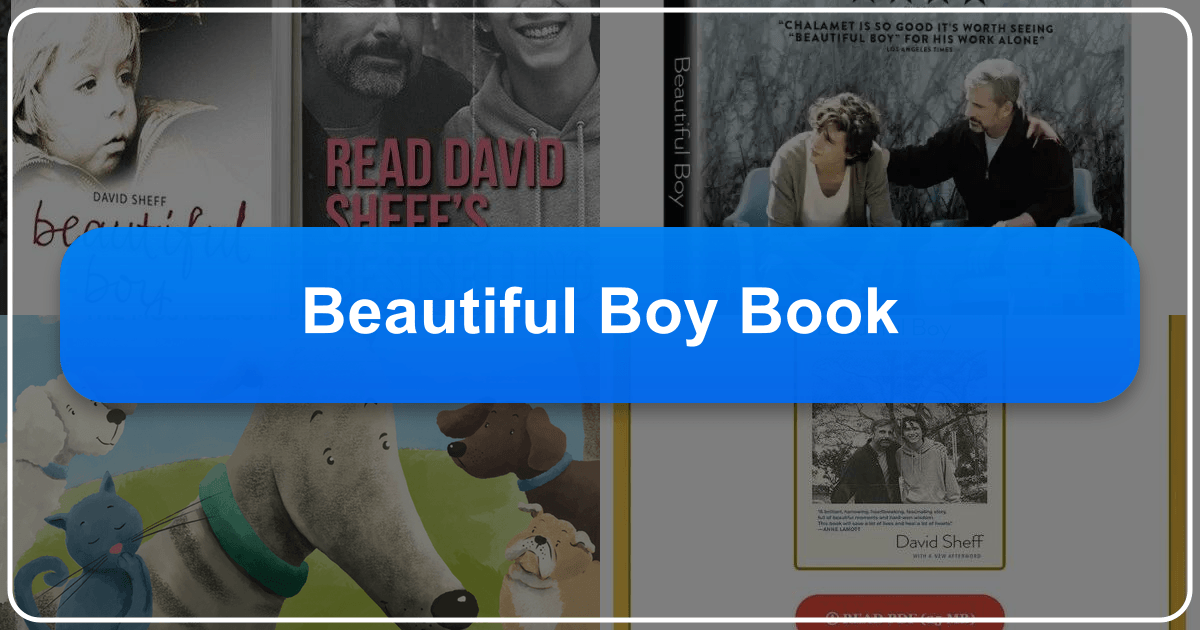Beautiful Boy: A Deep Dive into a Father's Journey Through Addiction

Beautiful Boy: A Father’s Journey Through His Son’s Addiction, by David Sheff, is a poignant and unflinching memoir that explores the devastating effects of methamphetamine addiction on a family. This exploration goes beyond a simple narrative of addiction, delving into the complex emotional landscape experienced by both the addict and their loved ones. The book’s raw honesty and insightful exploration of the subject matter have garnered significant critical acclaim and established it as a powerful contribution to the conversation surrounding addiction. Examining the book through the lenses of various relevant topics reveals its multifaceted impact.
The Genre and Impact of Beautiful Boy
Beautiful Boy falls squarely within the genres of memoir and biography, offering a first-hand account of a father’s struggle to support his son’s battle with addiction. The book’s intensely personal narrative, combined with David Sheff’s journalistic background, results in a compelling blend of emotional storytelling and factual detail. This approach allows the reader to connect deeply with the emotional toll of addiction on the family, while also providing valuable information about the nature of the addiction itself.

The book’s cultural impact is undeniable. Its raw honesty about a painful and often stigmatized subject has resonated with readers worldwide. The subsequent film adaptation starring Steve Carell and Timothée Chalamet further amplified the book’s reach, bringing the story to a broader audience and prompting crucial conversations about addiction within families and communities. The book’s popularity also underscores its status as a bestseller, with numerous reviews reflecting the emotional impact it has on its readers. Awards and accolades further solidify the book’s literary influence and impact.

The book’s popularity, however, has not been without its critics. Some have criticized the portrayal of privilege, arguing that the Sheffs’ socioeconomic status impacted their ability to cope with the addiction in ways unavailable to less fortunate families. Others have pointed out that the book, while deeply personal, may not represent the experiences of all families battling addiction. Nevertheless, the sheer volume of positive reviews and the book’s sustained relevance in the conversation about addiction highlight its significant cultural impact.
Literary Influence and Adaptations
The book’s literary influence extends beyond its immediate success. It’s become a staple in discussions about addiction in literature, offering a unique parental perspective frequently absent in narratives dominated by the addict’s experience. This has inspired further exploration of the topic from both parental and professional perspectives, enriching the body of work dedicated to understanding and addressing addiction. The film adaptation further expanded its reach, introducing the story and its themes to a new generation.
Authors: David Sheff’s Personal Journey and Writing Style

David Sheff’s personal experience directly informs his writing in Beautiful Boy. The emotional rawness and vulnerability he displays are integral to the book’s impact. Sheff’s journalistic background is also evident in his meticulous research and detailed descriptions of methamphetamine and its effects, adding a layer of informed analysis to the emotional narrative. His biography, therefore, is inherently intertwined with the book’s content. His inspirations, partly drawn from his own struggles with addiction in the past and his determination to help his son, are deeply evident in the emotional and intellectual depth of his writing. Beautiful Boy is not simply a memoir, it’s a testament to a father’s unwavering love and the struggles of navigating such an agonizing situation.
David Sheff’s Writing Style and Techniques
Sheff masterfully employs several writing techniques to enhance the book’s emotional power and informational value. He utilizes vivid imagery and sensory details to immerse the reader in the family’s experience. He structures the narrative chronologically, tracing Nic’s addiction from its onset through numerous relapses and attempts at recovery. Sheff’s journalistic background informs his incorporation of research into the text, offering readers insight into the science and social dynamics of methamphetamine addiction. Sheff’s approach is marked by a deep self-awareness and a willingness to acknowledge his own mistakes and shortcomings as a parent. This adds to the book’s honesty and relatability.
Reading and Learning: Lessons from Beautiful Boy
Beautiful Boy offers invaluable summaries of the devastating effects of methamphetamine addiction, not only on the individual struggling with the disease but on the entire family. The book transcends simple summaries, however, offering profound life lessons and insights into the importance of empathy, understanding, and self-care in the face of adversity. The book’s educational value lies in its ability to provide a deeper comprehension of addiction, helping readers understand its complexity, its progression, and its far-reaching consequences. The narrative prompts reflection on personal reading habits and the power of stories in connecting us to shared human experiences.
Life Lessons and Reading Habits
The book’s life lessons extend beyond the immediate context of addiction. It highlights the significance of unconditional love, the importance of setting healthy boundaries, and the necessity of prioritizing self-care for those supporting loved ones through addiction. It emphasizes the power of perseverance and hope, even in the face of seemingly insurmountable obstacles. The book’s impact on readers’ personal reflection about their own reading habits can’t be understated. The emotional intensity of the narrative encourages a deeper engagement with the text and a broader understanding of the author’s purpose and message.
Libraries and Accessibility: Where to Find Beautiful Boy
Beautiful Boy is readily available in various libraries. Public libraries across the globe include it in their collections, making the book accessible to a wide range of readers. The book is also available in digital libraries, expanding its accessibility even further. This wide availability emphasizes the importance of the book’s message and the need for its reach to extend to everyone who can benefit from reading it. Furthermore, given the book’s significance, it’s likely to become part of rare collections or archives over time, preserving its importance for future generations.
Digital and Physical Access
The digital availability of Beautiful Boy enhances its accessibility. E-book formats allow for convenient access anytime, anywhere, overcoming geographical barriers and making it readily available through digital libraries and online retailers. Meanwhile, the physical availability of the book in traditional libraries ensures continued access for those who prefer physical copies and may not have consistent online access. This dual accessibility approach significantly broadens the potential readership.
Conclusion: The Enduring Legacy of Beautiful Boy
Beautiful Boy is more than just a memoir; it’s a testament to the enduring power of love, the devastating impact of addiction, and the vital importance of open conversation surrounding this critical issue. Its accessibility in libraries, its lasting presence as a bestseller, and its impact on readers and viewers alike establish its enduring legacy. The book serves as a powerful tool for education, raising awareness, and providing support to those battling addiction and their loved ones. Its exploration of the emotional consequences of addiction across the whole family creates a profound and lasting effect on the reader. By offering a deeply personal and yet widely relatable perspective on addiction, Beautiful Boy continues to resonate with audiences and further critical analysis.